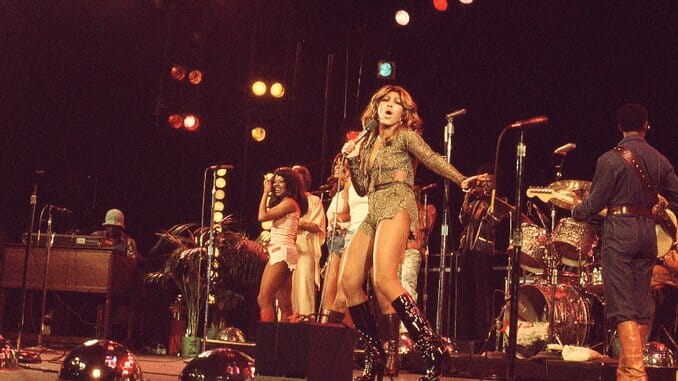Tina Gives Tina Turner the Final Word on Her Own Legacy

Tina Turner’s story is one of promise: Promises kept and broken, promise stifled then fulfilled. A vow of loyalty to her abusive ex-husband Ike suppressed her own potential. She might not be a comeback story, but she’s certainly a story of escape, growth and self-actualization in the face of personal and industrial adversity. The singer’s status in musical history is unimpeachable, but those recounting her story tend to drift towards its most lurid tabloid tellings. Tina directors Dan Lindsay and TJ Martin attempt to subvert this legacy of salacious headlines by examining it from the inside out. The documentary doesn’t fully escape the exploitative feeling of the talk show circuit it critiques, but putting it in context with new interviews and archival material of Turner explains what it’s all got to do, got to do with it.
Tina tracks the 81-year-old star from her musical start, linked with a relationship, to her current place in life, linked with love. Ironically for a film so adamant about separating Anna Mae Bullock’s story from that of Ike Turner—something that journalists failed to do up until the latter’s death in 2007—the first half is completely tied up with their shared Revue. While it feels a bit hypocritical at first, simply because Lindsay and Martin order their material so that Turner doesn’t explain how she feels defined by her abusive relationship until you’ve already begun the history lesson, you begin to understand that this delve into a shared past is a necessary evil—a painful process that sticks around for us so we can understand how it’s still stuck on her. In order to truly define and understand Tina, Ike and his traumatic influence must be isolated and examined.
And we do understand. Performances of soaring freedom, where Turner struts and shakes on stage like the rock god she truly is, convert new disciples with every long-legged kick and howl. Martin, Lindsay and editors Taryn Gould and Carter Gunn crosscut live performances over tracks with an energy that isn’t random or erratic, but with the same glowing confidence of their subject. Her voice may be a raw force of nature, but her performances are all skill and professionalism. Together, combined across stages and eras to find the biggest and best movements to emphasize the songs, her magnetism is inescapable. Just when we’ve comfortably settled into a concert doc’s rhythms, hypnotized by her charisma and ability, bang—we’re back on her past. It took her the whole first half of the film to leave and now what she’s left is dragged back out for her. It’s a sharp mimic of Tina’s career. Even soaring as the biggest pop star in the world, people focused on the scars.
Aural collages highlighting the hack questions of callous interviewers—a great fear for anyone in my shoes that has an ounce of self-awareness or compassion—form a crushing chorus of their own. How is Ike? Ike is up to such-and-such, how does that make you feel? The pain and repetition, the terrible media call that always asks the same questions, helps explain why there’s been a total eradication of celebrity responses apart from curated anecdotes and canned answers. It’s half marketing, half defense mechanism. But when you finally get past the “edited and condensed for space,” through the stories that’ve been tightly timed for commercials, you hear the real person underneath.
“I have been through fucking tons of heartbreak. I have analyzed it,” Turner says in one archival recording. “I’ve said, ‘What’s wrong with me?’ I’ve looked in the mirror at myself, stripped of makeup and without hair. Why can’t someone see the beauty in the woman that is who I am? Not a goddamn person has found it.” Hearing the raw recordings, from the tapes of journalists writing books or profiles about her, you get vulnerability and charisma that won’t fill you with pity—it’ll make you want to buy her a drink and get to know her like so few have.
-

-

-

-

-

-

-

-

-

-

-

-

-

-

-

-

-

-

-

-

-

-

-

-

-

-

-

-

-

-

-

-

-

-

-

-

-

-

-

-








































